JB Hi-Fi Bundle
Who Really Calls the Shots at JB Hi-Fi?
Ever wondered who's truly steering the ship at JB Hi-Fi, the electronics and entertainment retail giant dominating the Australian and New Zealand markets? Understanding JB Hi-Fi SWOT Analysis is crucial for investors and anyone interested in the company's future. From its humble beginnings in 1974, JB Hi-Fi has transformed, but who are the key players shaping its destiny today? This exploration delves into the heart of JB Hi-Fi's ownership.
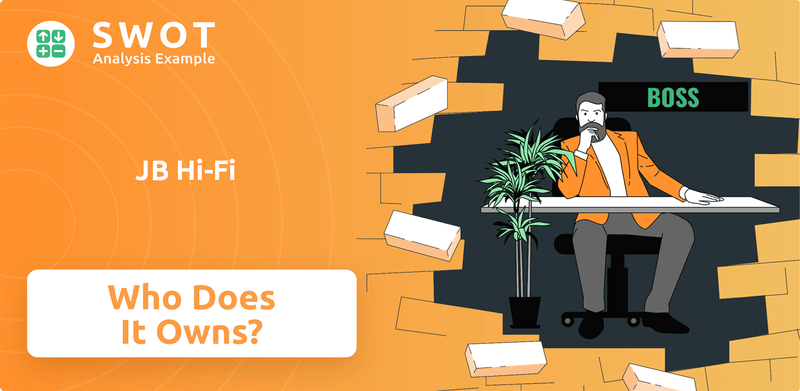
This deep dive into JB Hi-Fi ownership will uncover the company's structure, revealing the major shareholders and the influence they wield. We'll explore the evolution of JB Hi-Fi's ownership, tracing the changes from its founding to its current status as a publicly traded company. This analysis provides valuable insights for anyone seeking to understand the forces behind JB Hi-Fi's strategic direction and financial performance, including details on the JB Hi-Fi stock and the JB Hi-Fi parent company.
Who Founded JB Hi-Fi ?
The story of JB Hi-Fi begins in 1974, with John Barbuto at the helm. He established the first store in East Keilor, Melbourne, Australia. The initial focus was on offering a broad selection of hi-fi and recorded music products, setting the stage for the company's future in the electronics retail market. This marked the beginning of what would become a significant player in the Australian retail landscape.
Early on, JB Hi-Fi operated as a privately held company, with John Barbuto as the primary owner. Public records don't provide specific details on equity splits or initial shareholding percentages. The business model was built on providing competitive prices and a wide product range, a customer-centric approach that helped it stand out in the market. Funding likely came from Barbuto's personal investments and potentially from small loans provided by family and friends.
As a privately owned entity, the company's early structure was centered around Barbuto's vision. The initial phase of JB Hi-Fi didn't see any public records of complex agreements like vesting schedules or founder exits. There is no widely published information available regarding initial ownership disputes or buyouts during the company's private phase. The focus was on a lean operation aimed at disrupting the traditional electronics retail market.
JB Hi-Fi was founded in 1974 by John Barbuto in East Keilor, Melbourne, Australia.
The company initially focused on hi-fi and recorded music products.
Early ownership was primarily held by John Barbuto.
Early funding likely came from Barbuto's personal investments and small loans.
No public records of early agreements like vesting schedules or founder exits are available.
The business model was centered on competitive pricing and a wide product range.
Understanding the early days of JB Hi-Fi, the Target Market of JB Hi-Fi is critical to understanding its success. The company's initial strategy, under John Barbuto's leadership, emphasized value and a broad product selection, which helped it gain a foothold in the competitive electronics market. While specific financial details from the early years are not readily available, the company's growth trajectory from a single store to a major retail chain is a testament to the success of its foundational business model. As of early 2024, JB Hi-Fi continues to be a significant player in the Australian and New Zealand retail sectors.
JB Hi-Fi's early years were marked by private ownership and a customer-focused approach.
- Founded by John Barbuto in 1974.
- Initially focused on hi-fi and recorded music.
- Operated as a privately held company in its early stages.
- The business model emphasized competitive pricing and product variety.
JB Hi-Fi SWOT Analysis
- Complete SWOT Breakdown
- Fully Customizable
- Editable in Excel & Word
- Professional Formatting
- Investor-Ready Format
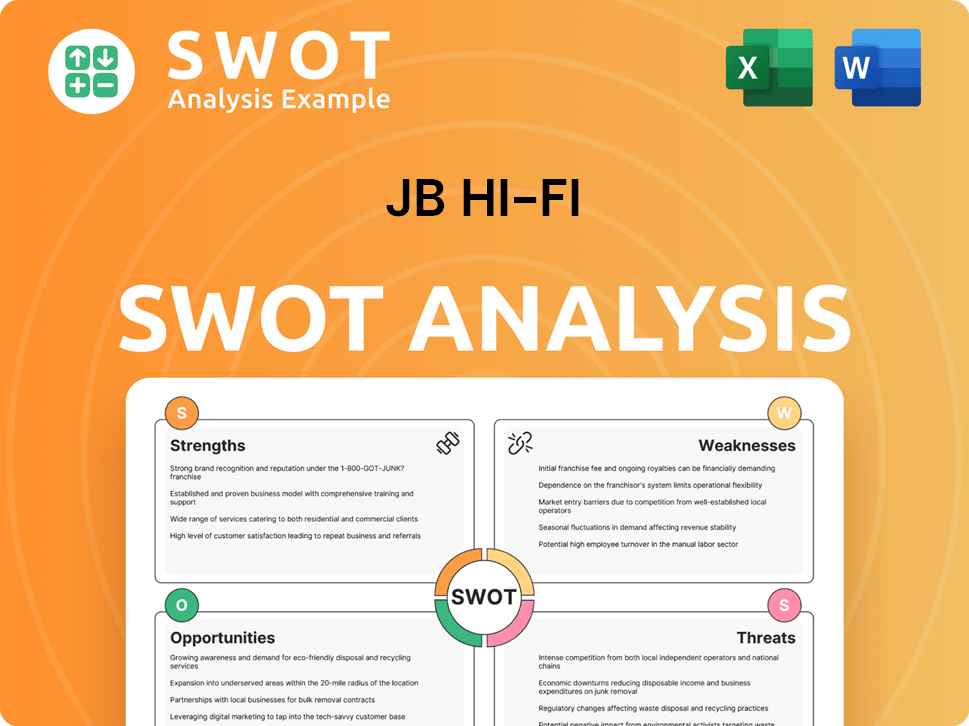
How Has JB Hi-Fi ’s Ownership Changed Over Time?
The evolution of JB Hi-Fi's ownership structure marks a significant transition from private to public ownership. Initially a privately held entity, the company undertook an Initial Public Offering (IPO) in October 2003, listing on the Australian Securities Exchange (ASX). This strategic move broadened its shareholder base, attracting a diverse group of investors and infusing capital to facilitate substantial expansion across Australia and New Zealand. The IPO was a pivotal moment, reshaping the company's financial landscape and governance model.
The shift to public ownership brought about increased transparency and accountability. The company's strategy and governance became subject to market forces and shareholder expectations. This change also meant that the ownership structure evolved, with institutional investors playing a more significant role.
| Event | Date | Impact on Ownership |
|---|---|---|
| Initial Public Offering (IPO) | October 2003 | Transitioned from private to public ownership; broadened shareholder base. |
| Expansion into New Zealand | Early 2010s | Increased market capitalization and investor interest. |
| Ongoing Institutional Investment | 2003-Present | Institutional investors, such as fund managers and superannuation funds, became major shareholders. |
As of recent filings and reports, the JB Hi-Fi ownership is primarily held by institutional investors. Major stakeholders typically include large fund managers, superannuation funds, and index funds. For example, as of April 2025, significant institutional shareholders commonly include Perpetual Limited, BlackRock, Vanguard, and AustralianSuper, holding substantial percentages of the company's shares. These institutional holdings collectively exert significant influence on company strategy and governance through their voting power at annual general meetings and their engagement with the board. The company's market capitalization, which reflects the total value of its outstanding shares, fluctuates based on market conditions and investor sentiment, impacting the perceived value of JB Hi-Fi stock.
JB Hi-Fi's ownership structure has evolved significantly since its IPO in 2003, transforming from a privately held company to one dominated by institutional investors.
- The IPO in October 2003 was a pivotal moment, expanding the shareholder base and providing capital for growth.
- Institutional investors, such as Perpetual Limited, BlackRock, Vanguard, and AustralianSuper, are major shareholders.
- The shift to public ownership has increased transparency and accountability.
JB Hi-Fi PESTLE Analysis
- Covers All 6 PESTLE Categories
- No Research Needed – Save Hours of Work
- Built by Experts, Trusted by Consultants
- Instant Download, Ready to Use
- 100% Editable, Fully Customizable
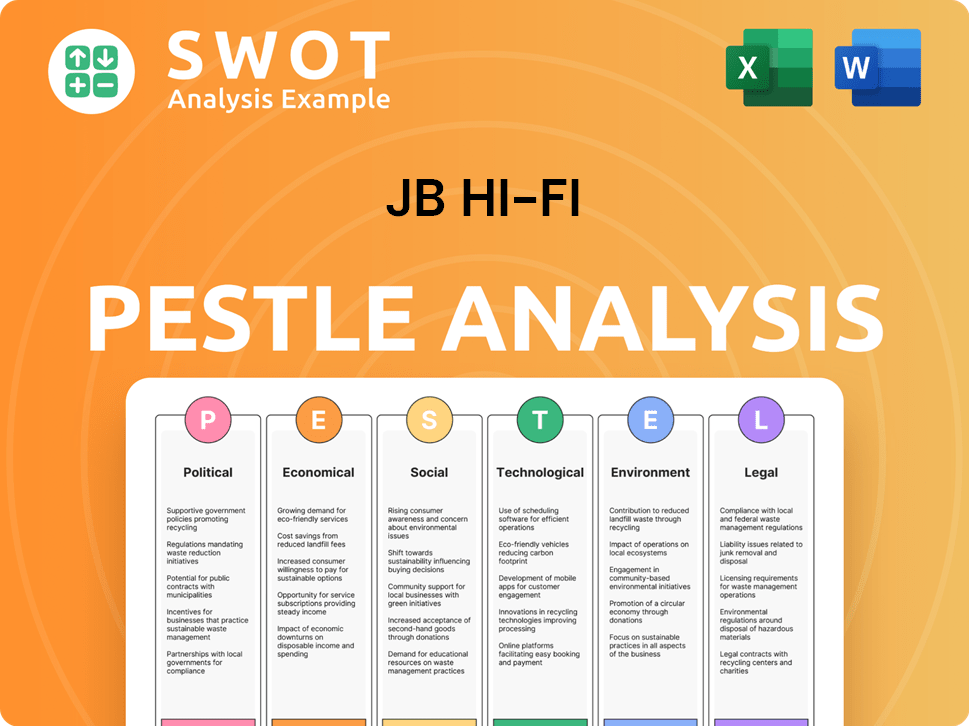
Who Sits on JB Hi-Fi ’s Board?
The Board of Directors of JB Hi-Fi Limited oversees the company's corporate governance. As of late 2024 and early 2025, the board typically includes independent and executive directors. These directors bring expertise in areas like retail, finance, and corporate strategy. Their role is to represent all shareholders, with independent directors ensuring objectivity.
The governance structure at JB Hi-Fi aims for fairness. The board's composition reflects a commitment to diverse expertise without direct representation from specific major shareholders, ensuring no single entity has outsized control. This approach helps maintain a balance of interests and supports the company's strategic direction.
| Board Member | Role | Notes |
|---|---|---|
| Richard Murray | CEO | Oversees the company's day-to-day operations and strategic direction. |
| Stephen Goddard | Chairman | Leads the board and ensures effective governance. |
| Holly Kramer | Non-Executive Director | Provides independent oversight and strategic guidance. |
The voting structure at JB Hi-Fi is straightforward: one share equals one vote. This means each ordinary share has equal voting power, supporting a democratic process for shareholder decisions. There are no special voting rights or dual-class shares that would give disproportionate control to any individual or entity. While institutional shareholders, due to their large holdings, wield significant voting power, this reflects their aggregated ownership rather than special privileges. There have been no significant governance controversies in recent years that have materially shaped decision-making beyond the standard course of business.
The board of directors at JB Hi-Fi is responsible for corporate governance, with a mix of independent and executive directors. The voting structure is one share, one vote, ensuring a fair process for shareholders. For a deeper dive into the company's structure, consider reading more about JB Hi-Fi's company profile.
- Independent directors ensure objectivity.
- One share, one vote voting structure.
- No special voting rights.
- Institutional shareholders have significant voting power.
JB Hi-Fi Business Model Canvas
- Complete 9-Block Business Model Canvas
- Effortlessly Communicate Your Business Strategy
- Investor-Ready BMC Format
- 100% Editable and Customizable
- Clear and Structured Layout
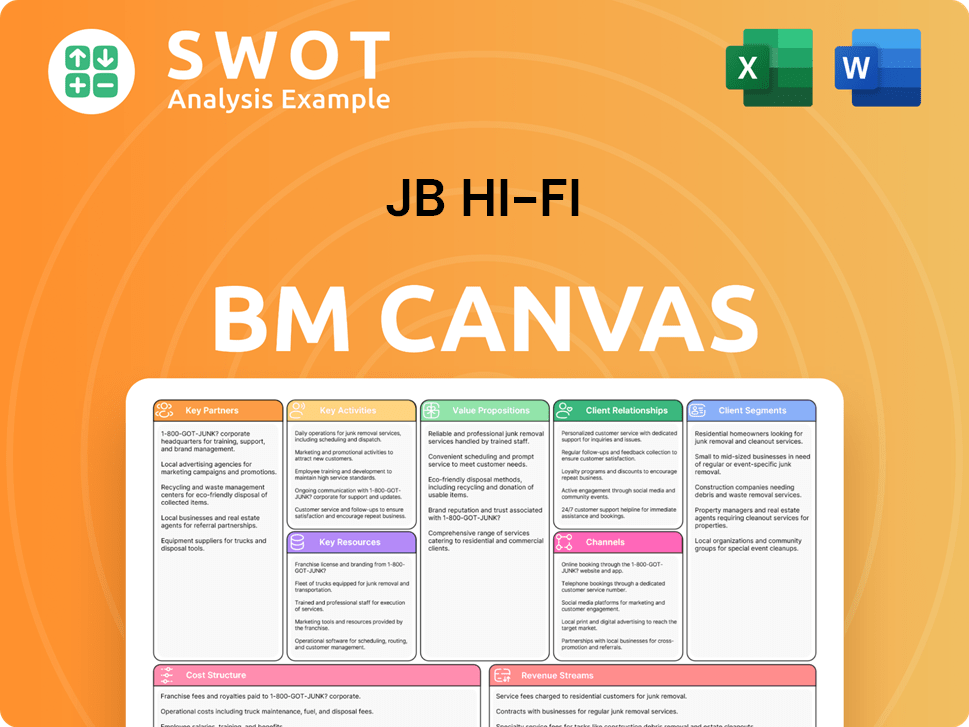
What Recent Changes Have Shaped JB Hi-Fi ’s Ownership Landscape?
Over the past three to five years (2022-2025), the ownership structure of JB Hi-Fi has remained largely consistent, with a strong presence of institutional investors. While the specific holdings of individual funds may fluctuate, the overall trend indicates continued confidence in the company's performance and market position. No major share buybacks or secondary offerings have significantly altered the ownership structure during this period. There have been no significant mergers, acquisitions, or leadership changes that would impact the ownership of JB Hi-Fi. The company continues to execute its business strategy, which may involve smaller, strategic acquisitions.
The ownership structure of established retailers like JB Hi-Fi typically sees a rise in institutional ownership as large funds seek stable, dividend-paying companies. The influence of the original founders has long transitioned to the executive management and board. The company remains a publicly traded entity, reflecting the broader market's investment in a profitable retail operation. For more insights into its operations, consider reading about the Revenue Streams & Business Model of JB Hi-Fi .
JB Hi-Fi's ownership is primarily characterized by institutional investors. The company is publicly traded, with no major ownership changes reported recently. The focus remains on stable performance and strategic growth within the retail sector.
Institutional ownership is a significant factor, with no founder-led changes. The company's strategy includes potential strategic acquisitions. The market capitalization and share price reflect the broader market's assessment of the company's value.
JB Hi-Fi Porter's Five Forces Analysis
- Covers All 5 Competitive Forces in Detail
- Structured for Consultants, Students, and Founders
- 100% Editable in Microsoft Word & Excel
- Instant Digital Download – Use Immediately
- Compatible with Mac & PC – Fully Unlocked
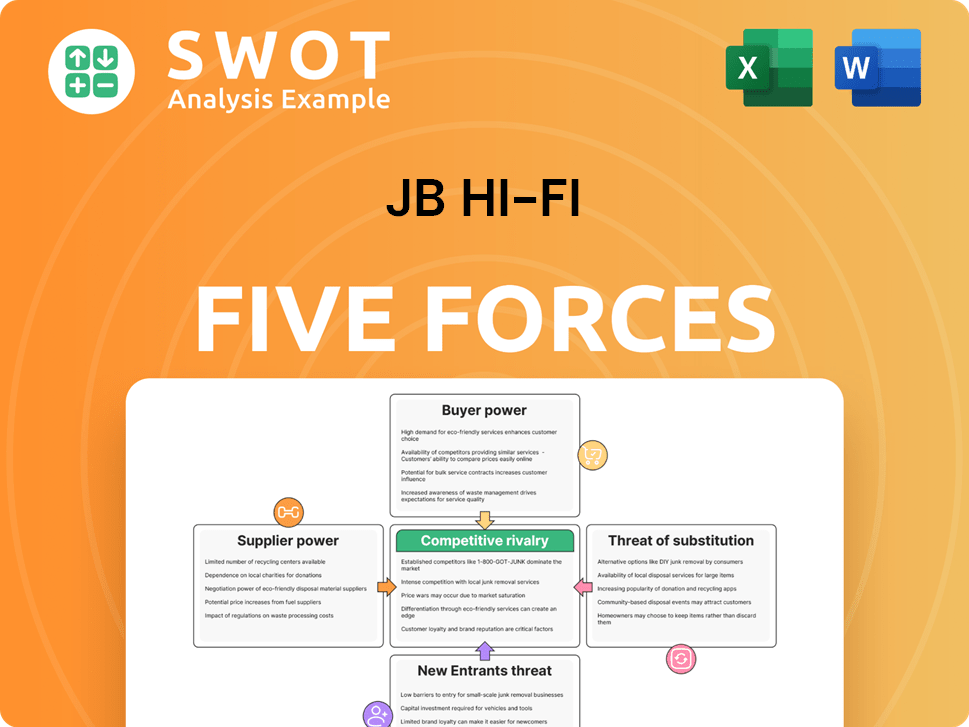
Related Blogs
- What are Mission Vision & Core Values of JB Hi-Fi Company?
- What is Competitive Landscape of JB Hi-Fi Company?
- What is Growth Strategy and Future Prospects of JB Hi-Fi Company?
- How Does JB Hi-Fi Company Work?
- What is Sales and Marketing Strategy of JB Hi-Fi Company?
- What is Brief History of JB Hi-Fi Company?
- What is Customer Demographics and Target Market of JB Hi-Fi Company?
Disclaimer
All information, articles, and product details provided on this website are for general informational and educational purposes only. We do not claim any ownership over, nor do we intend to infringe upon, any trademarks, copyrights, logos, brand names, or other intellectual property mentioned or depicted on this site. Such intellectual property remains the property of its respective owners, and any references here are made solely for identification or informational purposes, without implying any affiliation, endorsement, or partnership.
We make no representations or warranties, express or implied, regarding the accuracy, completeness, or suitability of any content or products presented. Nothing on this website should be construed as legal, tax, investment, financial, medical, or other professional advice. In addition, no part of this site—including articles or product references—constitutes a solicitation, recommendation, endorsement, advertisement, or offer to buy or sell any securities, franchises, or other financial instruments, particularly in jurisdictions where such activity would be unlawful.
All content is of a general nature and may not address the specific circumstances of any individual or entity. It is not a substitute for professional advice or services. Any actions you take based on the information provided here are strictly at your own risk. You accept full responsibility for any decisions or outcomes arising from your use of this website and agree to release us from any liability in connection with your use of, or reliance upon, the content or products found herein.